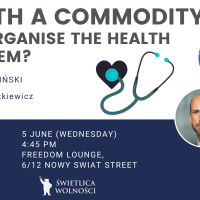
Twenty-five students and eleven lecturers gathered on October 13-16, 2016, in Mojmírovce, Slovakia, for the 7th annual Seminar on Austrian Economics organized by INESS. In the span of these four days, the participants had a chance to attend several insightful lectures, to discuss various topics with renowned experts from different fields, and to make new friends.
The event officially started on Thursday evening with an introductory speech made by Dr. Richard Ďurana, director of INESS, who welcomed the participants. Afterwards, Radovan Ďurana from INESS, gave the first lecture titled “The price of the state”, regarding Slovak public finances. The lecture provided an insight into how public financing works, explained how much is spent in various public sectors and what is the source of the government´s income, and demonstrated the level of the public debt. One of the points was that social benefits for the Roma population are not associated with problems in the public finance sector, thus a removal of the social benefits would be meaningless. Another point was how much the government spends on social benefits, particularly of the Roma, and that the Roma problem is not a fiscal one.
After the lecture, the students received a bundle consisting of high quality economic literature and other materials that were helpful during the rest of the seminar. Later on, the students met with the lecturers in a less formal atmosphere and discussed various topics in depth.
On the following day, Dr. Richard Ďurana from INESS, talked about intellectual property in his lecture titled “Patents against development”. He criticized the system of protection of intellectual property, such as patents and copyrights, for they only provide benefits to small groups. Such protection effectively prevents development, as innovators cannot build on and further develop modern knowledge. Afterwards, Dr. Robert Chovanculiak from INESS, spoke about the increasing phenomenon of the sharing economy, including such companies as UBER or Airbnb. The lecturer clarified how the system of sharing economy effectively replaces government regulations via using technologies, and secures safety and satisfaction of consumers.
In the afternoon, Juraj Karpiš from INESS, pointed out the deficiencies of the current financial system in his lecture called “Bad Money”. He depicted the correlation between financial crises and the monopolistic position of the central bank in distributing money. Then, František Múčka, editor-in-chief of Denník Postoj, introduced a topic related to the political-economic development in Slovakia after the Revolution, and clarified its relationship to the current political situation.
The main speaker of the seminar, Professor Jörg Guido Hülsmann from the University of Angers, concluded the second day with his speech on “Monetary Interventionism”. He clarified the difference between the old and modern forms of money and showed how bank notes evolved to the current form of paper money. Evening program comprised of informal discussions between students and the lecturers on various topics, including those covered in the lectures that day.
Professor Josef Šíma, President of CEVRO Institute in Prague, started the third day with a lecture on Austrian economics. Prof. Šíma familiarized the audience with the dawn of the Austrian school. He also mentioned Adam Smith, explained the connection between the quotations and the Austrian Economic School, and justified why many of the principles are still up-to-date. Moreover, he emphasized the fact that economics is a science related to human behaviour and argued that a lot of economic thoughts and macroeconomic indicators ignore this fact.
Another morning session, led by Juraj Bednár from DIGMIA, was dedicated to the topic of decentralization on the Internet. Inter alia, he talked about Bitcoin and the concept of “permissionless innovation”, such as in the case of Skype that operated without a telecommunication license.
In the afternoon, Professor Hülsmann denoted in his presentation, “The Ethics of Returns on Capital”, the relationship between religion and savings, and clarified how individual preferences bolster the exchange of goods and contribute to welfare. Afterwards, Tomáš Szalay, Director of the Health Policy Institute, introduced a topic dedicated to the Slovak healthcare system. He explained the relation between health and economy and showed how emotions affect the objective assessment of the healthcare system. He pointed out the weaknesses of the Slovak system, providing examples of its positive and negative reforms. Moreover, he illustrated how the volume of investments in the healthcare system impacts the quality of life and health of citizens. Professor Šíma concluded Saturday evening with his presentation on “Economy and Anarchy”. He quoted Smith´s definition of anarchy as an absence of political hierarchy, not an absence of rules. He also criticized the concept of foreign aid that he regarded as shifting capital from the poor people of richer countries to the wealthy people (namely politicians) of poorer states. During the last evening, the students had a chance to enjoy sauna, pool, or even a shooting range, then followed by discussions on numerous topics.
The last day began with a speech by Professor Šíma on “Defence and Justice in the Market”, where he pointed out the weaknesses of the government´s protection and jurisdiction, using various real-world examples. He argued that the market functions on the basis of free voluntary exchange only because everyone derives benefits from it. Afterwards, Professor Hülsmann covered a topic called “The Political Economy of Liquidity”, which encompassed banking and bank solvency. Moreover, he explained how central banks protect government bonds and make them less risky and why it is vital that commercial banks hold a certain level of reserves.
Before the closing ceremony, Adam Dzurák from Slovak Students for Liberty introduced the student organization to the participants and explained how to get involved. The conference ended with a concluding speech by Dr. Richard Ďurana who thanked the participants and the lecturers on behalf of INESS. Then Dr. Ďurana, with the help of Professor Šíma and Professor Hülsmann, awarded the participants with certificates.
The Seminar on Austrian Economics was organised thanks to the financial support of Tatra Banka Foundation and EPH Foundation, to whom we would like to express our gratitude. Furthermore, we would like to thank our medial partners – Denník Postoj, Aktuality.sk, and Konzervatívny inštitút M.R. Štefánika, which helped to co-organize the journey of Professor Hülsmann.
Translated by Dominik Zeliznak
























